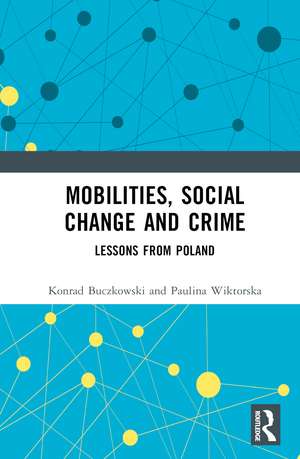Mobilities, Social Change and Crime: Lessons from Poland
Autor Konrad Buczkowski, Paulina Wiktorskaen Limba Engleză Hardback – 5 dec 2023
Preț: 996.83 lei
Preț vechi: 1215.65 lei
-18% Nou
Puncte Express: 1495
Preț estimativ în valută:
190.75€ • 199.56$ • 158.45£
190.75€ • 199.56$ • 158.45£
Carte tipărită la comandă
Livrare economică 02-16 aprilie
Preluare comenzi: 021 569.72.76
Specificații
ISBN-13: 9781032446349
ISBN-10: 103244634X
Pagini: 122
Ilustrații: 1 Tables, black and white; 10 Line drawings, black and white; 1 Halftones, black and white; 11 Illustrations, black and white
Dimensiuni: 156 x 234 x 13 mm
Greutate: 0.35 kg
Ediția:1
Editura: Taylor & Francis
Colecția Routledge
Locul publicării:Oxford, United Kingdom
ISBN-10: 103244634X
Pagini: 122
Ilustrații: 1 Tables, black and white; 10 Line drawings, black and white; 1 Halftones, black and white; 11 Illustrations, black and white
Dimensiuni: 156 x 234 x 13 mm
Greutate: 0.35 kg
Ediția:1
Editura: Taylor & Francis
Colecția Routledge
Locul publicării:Oxford, United Kingdom
Public țintă
PostgraduateCuprins
Introduction; 1. Selected Theoretical Concepts on the Transformation of Modern Societies – from the Fall of Communism to the Era of Mobility. Changes in Poland in Comparison with the Countries of the Region; 2. Towards Universal Mobility – Changes in Crime between 1990 and 2020 based on the example of Poland; 3. What's Next? Crime in the First Year of the COVID-19 Pandemic; 4. Summary
Notă biografică
Konrad Buczkowski is Assistant Professor at the Department of Criminology of the Institute of Legal Sciences of the Polish Academy of Sciences and the Institute of Justice. His research interests focus primarily on economic crime from both dogmatic and empirical perspectives. He is a co-author of one of the first monographs on money laundering in Poland and one of the first empirical studies on economic crime in Poland. He is author of several dozen articles published in scientific journals. He is a member of the European Society of Criminology and a member of the board of directors of the Polish Society of Criminology named after Prof. Stanisław Batavia. He is also the secretary of the editorial board of "The Polish Bulletin of Criminology".
Paulina Wiktorska is Assistant Professor at the Department of Criminology of the Institute of Legal Sciences of the Polish Academy of Sciences and the Institute of Justice. Her research interests focus primarily on criminal policy, sociology of law, methodology in legal sciences, penitentiary law, and domestic violence. She is author of several dozen articles published in scientific journals. She is a member of the European Society of Criminology and the Polish Society of Criminology named after Prof. Stanisław Batavia. She is also a member of the editorial board of "The Polish Bulletin of Criminology".
Paulina Wiktorska is Assistant Professor at the Department of Criminology of the Institute of Legal Sciences of the Polish Academy of Sciences and the Institute of Justice. Her research interests focus primarily on criminal policy, sociology of law, methodology in legal sciences, penitentiary law, and domestic violence. She is author of several dozen articles published in scientific journals. She is a member of the European Society of Criminology and the Polish Society of Criminology named after Prof. Stanisław Batavia. She is also a member of the editorial board of "The Polish Bulletin of Criminology".
Descriere
This book presents a synthesis of selected trends in the dynamics and structure of crime in Poland in context of ongoing social transformations. It explores the impact of the deep systemic transformation of the late 1980s and early 1990s on the phenomenon of crime, its structure and dynamics, and the policy of its control in the following decades.
